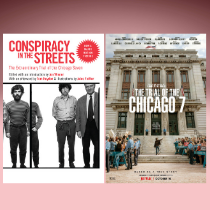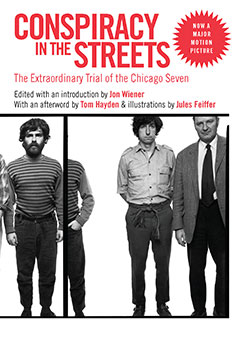The Story of the Chicago Seven and the Infamous 1969 Trial

Aaron Sorkin’s new film The Trial of the Chicago 7 releases for streaming on Netflix this Friday, October 16th. It tells the story of the seven people who faced conspiracy charges after the uprising at the 1968 Democratic National Convention in Chicago and the trial that followed. The film, which has had a limited theatrical release, has garnered positive reviews and comparisons to Arthur Millers The Crucible, highlighting how this trial from the fall of 1969 speaks to our present moment. The all-star cast includes Sacha Baron Cohen, Joseph Gordon-Levitt, Michael Keaton, Frank Langella, Eddie Redmayne and others.
To coincide with the film’s release we reprinted Conspiracy in the Streets, a transcript of the proceedings edited by Jon Wiener that provides the political and historical background to this infamous trial. The book also includes courtroom drawings by Jules Feiffer an afterword by the late activist (and one of the seven defendants) Tom Hayden examines the trial’s ongoing relevance.
In August 1968, outside of the Democratic National Convention in Chicago, some 10,000 young people gathered to protest the ongoing Vietnam War and to confront the politicians who supported it. The demonstrators were met by police, National Guardsman, and soldiers in similar numbers. The two sides clashed and the resulting battles were broadcast on national television. Eight months later, prosecutors indicted the eight leaders of the protest, charging them with conspiracy and incitement to riot.
The trial began in September 1969. The defendants—Rennie Davis, Dave Dellinger, John Froines, Tom Hayden, Abbie Hoffman, Jerry Rubin, Bobby Seale (the co-founder of the Black Panther Party who was ultimately removed from the trial, making it seven and not eight who were on trial), and Lee Weiner—openly lampooned the proceedings, blowing kisses to the jury, wearing their own judicial robes, and bringing a Viet Cong flag into the courtroom. Eventually the judge ordered Seale to be bound and gagged for insisting on representing himself. Adding to the theater in the courtroom an array of celebrity witnesses appeared, among them Timothy Leary, Norman Mailer, Arlo Guthrie, Judy Collins, and Allen Ginsberg (who provoked the prosecution by chanting “Om” on the witness stand).

Like Sorkin’s film, which condenses the trial into a digestible 129 minutes, Conspiracy in the Streets provides readers with an abridged version of the trial, while adding historical background and commentary. As Jon Wiener states in his Editor’s Notes: “The original trial transcript is 22,000 pages long; in cutting it down to 193 pages, we tried to select not only the most historically significant passages, but also some of the most dramatic confrontations and most amazing moments, in an effort to convey to readers the now legendary aspects of the trial.”
The 1960s were a turbulent time that saw the rise of social movements, like the Civil Rights Movement, and a youth counter culture that took to the streets to protest and demonstrate against injustice and the Vietnam War. Instead of reforming or bringing about change, Tom Hayden notes in his afterword, police “went on a crusade to ‘neutralize’ the New Left.” We’ve seen similar scenes in 2020. While in the midst of a global pandemic and a heated election year, police, National Guardsman, and other government agents have clashed with demonstrators in cities around the country.
Hayden goes on to write: “I am haunted by this question: are we members of the sixties generation, now the elders ourselves, still doing all we can to realize the dreams of our youth? The generational story is far from over, and this publication of excerpts from the Chicago trial transcripts, along with the painstaking history by Jon Wiener, is an important contribution to the intergenerational dialogue we must have.”
Join the conversation on Tuesday, October 20th at 8:00 pm ET in an online event with McNally Jackson Independent Booksellers. Editor Jon Wiener will discuss the events surrounding the trial, Aaron Sorkin’s The Trial of the Chicago 7, and the book with New York Times film critic A.O. Scott.
